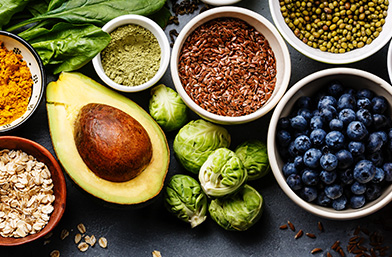Support Your Health
Stress comes from many circumstances, both internal and external.
Major life changes, like starting a new school, moving to a new city, or enduring a global pandemic can increase stress and anxiety. No matter the source, anxiety management is possible.
One simple way to support your mental health during difficult times is to eat a healthy diet. I get it, when you’re stressed it feels more comforting to reach for the soft cookie instead of an apple or cheesy pizza slice over oven-baked potatoes and vegetables. Hopefully this article can convince you to slowly swap impulsive food choices that offer instant gratification for nourishing alternatives that yield long term mental health benefits.
Keep reading to learn how small dietary changes can support your health.

Nutrition and Anxiety
Your nutrition can either soothe or exacerbate your anxiety symptoms. Don’t fret, this is good news — this means that you can take control of your anxiety.
A diet full of foods that fuel a healthy brain includes high-antioxidant foods like colorful fruits and vegetables, healthy fats, and whole grains. In the short term, this kind of diet can help you with memory recall and concentration during a difficult exam. In the long term, a healthy diet can increase your brain’s neuroplasticity AKA its ability to change.
When you feel stressed, you can support your body and mind by making healthy food choices. Instead of turning to sugar or caffeine for a quick pick-me-up, try eating a balanced snack that includes fat or protein. Or if you’re feeling weighed down by stress, try comforting yourself with a warm caffeine-free drink, like herbal tea. Other comforting foods, like oatmeal topped with cinnamon and homemade soup are also great grounding choices for stress relief.
Food Choices
1. High-Antioxidant Foods
Try berries.
Blueberries, raspberries, blackberries, goji berries, and strawberries make perfect snacks when paired with slivered almonds, walnuts, and your favorite yogurt. You can also buy frozen berries and make a refreshing smoothie with banana, peanut butter, and nondairy milk.
2. Healthy Fats
Try avocados.
Add avocado to smoothies, to salads, or make avocado toast by mashing one half of an avocado with 1 tablespoon of salsa and put it on your favorite kind of sourdough or whole grain bread.
3. Whole Grains
Swap out refined grains for whole grains for not only long-term brain health but also more satiation during meal and snack time. Try these swaps: white bread for whole wheat bread, cereal for oatmeal, maple syrup, and berries, fried white rice for brown rice sushi, or pasta with whole wheat or quinoa pasta.
4. Dark Leafy Greens
I know steamed kale isn’t ideal for everyone’s palate, but there are ways to sneak greens into your diet. You can blend a handful of spinach into a fruit smoothie, finely chop baby kale and stir it into whole wheat pasta, or use collard greens as a sandwich wrap.
5. Healthy Dessert
Try dark chocolate.
My favorite! Try different percentages of dark chocolate to see which tastes the best to you. The lower the percentage the sweeter it’ll taste and the higher the percentage the more bitter the taste. Top your oatmeal or fruit salad with 1-2 tablespoons of chopped dark chocolate or dark chocolate chips. Bonus: this is also high in antioxidants
Improve Your Quality of Life
Overall, if you suffer from anxiety symptoms eating a balanced diet with plenty of vitamins and minerals is a safe way to improve your quality of life.
Learning to manage your mental health may take a few lifestyle changes, but you don’t have to do it on your own. Contact Anxiety Institute today to get extra support from compassionate, dedicated professionals ready to help.

